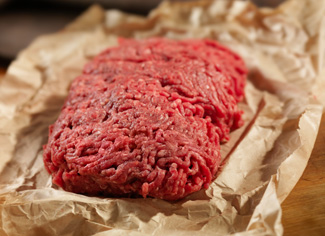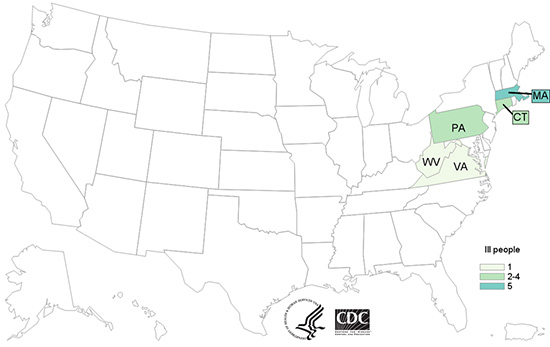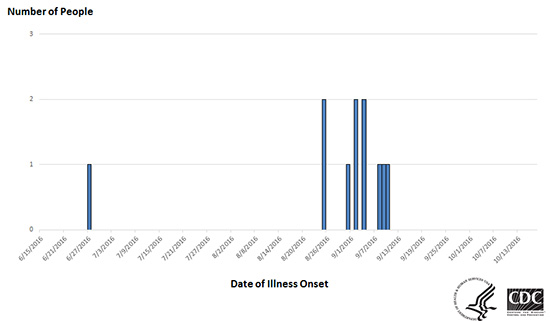2016 E. coli Outbreak Linked to Beef Products Produced by Adams Farm
Posted October 19, 2016 12:15PM EST
This outbreak appears to be over. However, the recalled beef, veal, and bison products may still be in freezers. Consumers who don’t know about the outbreak could continue to eat recalled products and get sick. Read the Recall and Advice to Consumers, Restaurants, and Retailers.
- Read the Recall & Advice to Consumers, Restaurants, and Retailers>>
- This outbreak appears to be over. However, the recalled beef, veal, and bison products may still be in freezers. Consumers who don’t know about the outbreak could continue to eat recalled products and may get sick.
- CDC recommends that consumers, restaurants, and retailers do not use, serve, or sell the recalled beef, veal, and bison products.
- These items were shipped to farmers’ markets, retail locations, and restaurants in Massachusetts, Connecticut, and eastern New York. The products also may have been shipped to neighboring states.
- Don’t cook recalled products and eat them. Throw them out or return them to the place of purchase. If you throw them away, put them in a sealed bag in the trash so that children, pets, or other animals can’t eat them.
- Remember to check freezers for recalled products.
- On September 24, 2016, Adams Farm Slaughterhouse recalled beef, veal, and bison products due to possible E. coli O157:H7 contamination. The products, marked with EST. 5497 inside the USDA mark of inspection, include several lot numbers and cuts of meat. The full list can be found on the USDA-FSIS website.
- CDC, several states, and the U.S. Department of Agriculture Food Safety and Inspection Service (USDA-FSIS) investigated this multistate outbreak of Shiga toxin-producing Escherichia coli O157:H7 (STEC O157:H7) infections.
- Eleven people infected with the outbreak strain of STEC O157:H7 were reported from five states.
- Seven ill people were hospitalized. One ill person developed hemolytic uremic syndrome, a type of kidney failure, and no deaths were reported.
- Epidemiologic, traceback, and laboratory evidence indicated that beef products produced by Adams Farm Slaughterhouse in Athol, Massachusetts, were the likely source of this outbreak.
Introduction
CDC collaborated with public health and regulatory officials in several states and the U.S. Department of Agriculture Food Safety and Inspection Service (USDA-FSIS) to investigate a multistate outbreak of Shiga toxin-producing Escherichia coli O157:H7 (STEC O157:H7) infections.
Public health investigators used the PulseNet system to identify illnesses that may be part of this outbreak. PulseNet, coordinated by CDC, is the national subtyping network of public health and food regulatory agency laboratories. PulseNet performs DNA fingerprinting on STEC bacteria isolated from ill people by using techniques called pulsed-field gel electrophoresis (PFGE) and whole genome sequencing (WGS). CDC PulseNet manages a national database of these DNA fingerprints to identify possible outbreaks. In this outbreak, the outbreak strain was defined by PFGE.
Eleven people infected with the outbreak strain of STEC O157:H7 were reported from five states. A list of the states and the number of cases in each can be found on the Case Count Map page.
Illnesses started on dates ranging from June 27, 2016 to September 10, 2016. Ill people ranged in age from 1 year to 74, with a median age of 32. Forty-five percent of ill people were female. Seven ill people were hospitalized. One ill person developed hemolytic uremic syndrome, a type of kidney failure, and no deaths were reported.
Investigation of the Outbreak
Epidemiologic, traceback, and laboratory evidence indicated that beef products produced by Adams Farm Slaughterhouse in Athol, Massachusetts, were the likely source of this outbreak.
In interviews, ill people answered questions about the foods they ate and other exposures in the week before they became ill. Seven (100%) of the seven people reached for interview reported eating ground beef in the week before they became ill. Traceback information indicated that six (86%) of these seven ill people ate ground beef produced by Adams Farm Slaughterhouse.
The Connecticut Department of Public Health collected leftover Adams Farm Slaughterhouse ground beef from an ill person’s home and from a restaurant for testing. Test results showed the outbreak strain of STEC O157:H7 in both samples of leftover ground beef.
On September 24, 2016, Adams Farm Slaughterhouse recalled various cuts of beef, veal, and bison products due to possible E. coli O157:H7 contamination. The products originated from animals slaughtered on July 15, 25, and 27, 2016 and August 3, 8, 10, 11, 17, 24, and 26, 2016, and further processed and packed on various dates between July 21 and September 22, 2016. These items were shipped to farmers’ markets, retail locations, and restaurants in Massachusetts, Connecticut, and eastern New York. The products may have been shipped to neighboring states. The products subject to recall have establishment number EST. 5497 inside the USDA mark of inspection and include several lot numbers and cuts of meat. The full list can be found on the USDA-FSIS website.
This outbreak appears to be over. However, the recalled beef, veal, and bison products may still be in freezers. Consumers who don’t know about the outbreak could continue to eat recalled products and get sick. Read the Recall and Advice to Consumers, Restaurants, and Retailers.


